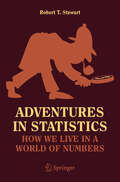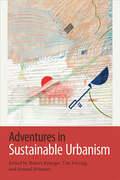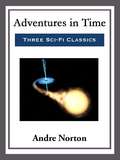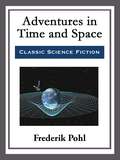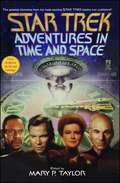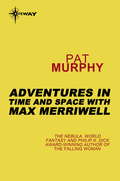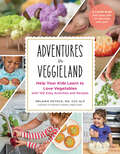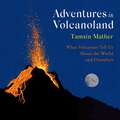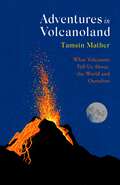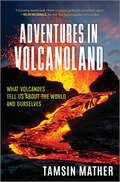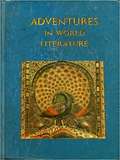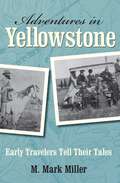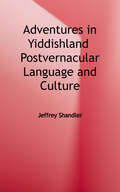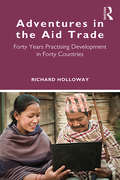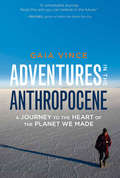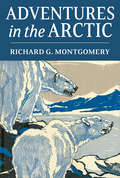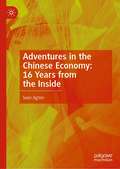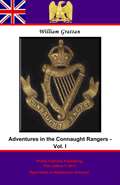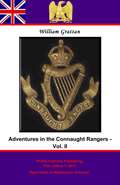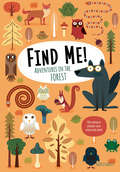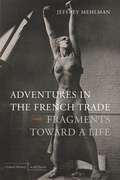- Table View
- List View
Adventures in Statistics: How We Live in a World of Numbers (Copernicus Books)
by Robert T. StewartThis book is about how statistics play a role in life, whether in business, psychology, biology, economics, or just about anything short of basket weaving. You cannot make a trip to the doctor, watch a football game, or even go to the grocery store without some statistic staring you down. Your age, weight, and cholesterol make you a high risk for diabetes … the chance that your team will win the game is 12.5 percent … 4 out of 5 dentists like this toothpaste. What does it all mean? Adventures in Statistics: How We Live in a World of Numbers tells you what all those numbers mean. But the book does not spit out a bunch of mathematical formulas; the book tells stories. Stories that explain statistics through popular culture, sports, and history. You’re confused about that false positive warning in that drug commercial, the 2007 comedy Juno explains how medical tests – including pregnancy tests – fail and why. Not clear about what your coworkers are talking about when they say, ‘black swans.’ the 1997 blockbuster Titanic makes sense of the concept. Adventures in Statistics: How We Live in a World of Numbers shows how professionals in medicine, business, politics, sports, and many other fields use numbers. So, just about everyone would gain from reading this book, perhaps even basket weavers.
Adventures in Surfing (Fountas & Pinnell LLI Purple #Level Q)
by Sunita ApteAdventures in Surfing by Sunite Apte
Adventures in Sustainable Urbanism (SUNY Press Open Access)
by Robert Krueger; Tim Freytag; Samuel MössnerIn the context of urban sustainable development, the "details" of sustainability's current expressions perpetuate environmental injustice, untenable growth, and the destruction of functioning ecosystems. In response to this state of affairs, Adventures in Sustainable Urbanism aims to prompt new debates about the consequences of sustainable urbanism as it moves from planning to practice. Contributors explore policy, practice, and experience from cities around the world, including Calgary, Christchurch, Dortmund, Vancouver, and others. Written by scholars who live in these cities, chapters offer empirically rich descriptions for opening up new lines of thinking, theorizing, and debate about the sustainable city and its actual material expressions in place. By examining the sustainable city through various analytical framings, contributors urge readers to move from viewing the sustainable city as something everyone can agree on, to a highly politicized and contested process. Additional resources are provided for readers who may wish to extend their own research into a city or theme.SUNY Press has collaborated with Knowledge Unlatched to unlock KU Select titles. The Knowledge Unlatched titles have been made open access through libraries coming together to crowd fund the publication cost. Each monograph has been released as open access making the eBook freely available to readers worldwide. Discover more about the Knowledge Unlatched program here: https://knowledgeunlatched.org/. It can also be found in the SUNY Open Access Repository at https://soar.suny.edu/handle/20.500.12648/8435.
Adventures in Time
by Andre NortonCollected in one omnibus edition are three of Andre Norton's best known works: 'The Time Traders,' 'The Defiant Agents,' and 'Key Out of Time.' Join Ross Murdock on these three fantastic adventures in time as he's called on to save Terra again and again.
Adventures in Time and Space
by Frederik PohlCollected here are five adventures from Science Fiction Writers of America Grand Master and Science Fiction Hall of Fame member, Frederik Pohl. Each of these stories will transport you to an imaginative place and time. Pohl was one of the best science fiction writers of all time and these are some of his best stories.
Adventures in Time and Space
by Mary P. TaylorStardate 1999. To commemorate twenty years of thrilling Star Trek novels, Pocket Books is proud to present a one-of-a-kind tribute volume highlighting the most unforgettable moments from a generation of bold explorations by some of the most imaginative science fiction authors of our time! Selected by an expert Star Trek fan, Star Trek: Adventures In Time and Space contains page after page of terrific Star Trek moments. Over the course of two decades, Pocket Books has published hundreds of fantastic adventures set in the astounding universes of Star Trek, Star Trek: The Next Generation®, Star Trek: Deep Space Nine®, and Star Trek: Voyager®. Here is the crème de la crème of Starfleet's literary voyages: the most dramatic confrontations, the strangest aliens, the most deadly perils that ever tested Kirk, Picard, Sisko, Janeway, and their valiant crews. Journey backwards through time to sample the best the future has to offer! SPECIAL BONUS FEATURE: The Star Trek Novel Chronology, showing where each book falls in the grand Star Trek saga -- because readers demanded it!
Adventures in Time and Space with Max Merriwell: The Complete Novels Wild Angel And Adventures In Time And Space With Max Merriwell
by Pat MurphySusan Galina and her friend Pat have escaped their normal lives into the elegant, isolated world of the Odyssey, a luxury cruise ship heading from New York to Europe via Bermuda. Pat is working on her doctoral thesis in quantum physics, and Susan is recovering from a recent and unhappy divorce.To Susan's delight, she discovers that her favourite author, Max Merriwell, is also aboard ship, teaching a writers' workshop. Susan's life becomes even more interesting when she meets Tom Clayton, the handsome chief of security. This cruise looks very promising indeed. But the pleasant shipboard vacation turns dark as the Odyssey passes into the Bermuda Triangle. Each year, Max Merriwell writes three novels: a science fiction novel under his own name, a fantasy novel under the pseudonym Mary Maxwell, and a mystery novel under the pseudonym Weldon Merrimax. The trouble begins when Max receives a threatening note that appears to come from Weldon Merrimax, Max's own pseudonym. Susan hears wolves howling in the night, the ship's passengers are seized with a dancing mania, and monsters lurk in the ship's corridors. An eyewitness reports a murder - but the victim of the crime is not on the passenger list and the body is nowhere to be found. While others struggle to understand these strange events, Pat seeks the explanation in quantum theory.
Adventures in Two Worlds
by A. J. CroninAdventures in Two Worlds is the 1952 autobiography of Dr. A. J. Cronin, in which he relates, with much humour, the exciting events of his dual career as a medical doctor and a novelist.Adventures in Two Worlds: Dr Cronin's published novels make up an imposing list of successes. This book, his first non-fiction work, which relates moving and dramatic episodes from his dual career as doctor and novelist will certainly be as widely ready and applauded as his preceding publications.Dr Cronin has recorded not only the achievements of his early life but also the struggles and setbacks that gave him such a sympathetic understanding of the sufferings of others.
Adventures in Veggieland: Help Your Kids Learn To Love Vegetables--with 100 Easy Activities And Recipes
by Melanie PotockYour kids can learn to love vegetables—and have fun doing it! So long to scary vegetables; hello to friendly new textures, colors, and flavors! Here is a foolproof plan for getting your kids to love their vegetables. Just follow the “Three E’s”: Expose your child to new vegetables with sensory, hands–on, educational activities: Create Beet Tattoos and play Cabbage Bingo! Explore the characteristics of each veggie (texture, taste, temperature, and more) with delectable but oh–so–easy recipes: Try Parsnip-Carrot Mac’n’Cheese and Pepper Shish Kebabs! Expand your family’s repertoire with more inventive vegetable dishes—including a “sweet treat” in every chapter: Enjoy Pears and Parsnips in Puff Pastry and Tropical Carrot Confetti Cookies! With 100 kid–tested activities and delicious recipes, plus expert advice on parenting in the kitchen, Adventures in Veggieland will get you and your kids working (and playing!) together in the kitchen, setting even your pickiest eater up for a lifetime of healthy eating.
Adventures in Volcanoland: What Volcanoes Tell Us About the World and Ourselves
by Tamsin MatherAdventures in Volcanoland charts journeys across deserts, through jungles and up ice caps, to some of the world's most important volcanoes, from Nicaragua to Hawaii, Santorini to Ethiopia, exploring Tamsin Mather's obsession with these momentous geological formations, the cultural and religious roles they have played in the minds of those living around them at different times throughout history, and the science behind their formation and eruptions.Volcanoes help to make and shape our world, bursting forth from inside of the earth and, in many places, looming over us. Present since the earth's beginning they continue to maintain its life support systems and, their extraordinary chemistry may even have created the ingredients needed for life to kick start.In some places volcanoes are even beginning to provide us with part of the energy we need to curb our use of fossil fuels. They have fascinated humans for millennia, their eruptions charted throughout history, seeming to show us how the earth has been living, breathing and changing for billions of years.Why exactly are these geological mammoths found where they are? What can they teach us about our environment, the Anthropocene and the ecological disaster that is climate change? Are there volcanoes on other planets, and what might they tell us about whether we could one day live there if we exhaust our own habitat? How can we predict if or when volcanoes might explode?Adventures in Volcanoland is an enthralling mix of travel, science and environmental writing for fans of Robert MacFarlane and Raynor Winn.
Adventures in Volcanoland: What Volcanoes Tell Us About the World and Ourselves
by Tamsin MatherAdventures in Volcanoland charts journeys across deserts, through jungles and up ice caps, to some of the world's most important volcanoes, from Nicaragua to Hawaii, Santorini to Ethiopia, exploring Tamsin Mather's obsession with these momentous geological formations, the cultural and religious roles they have played in the minds of those living around them at different times throughout history, and the science behind their formation and eruptions.Volcanoes help to make and shape our world, bursting forth from inside of the earth and, in many places, looming over us. Present since the earth's beginning they continue to maintain its life support systems and, their extraordinary chemistry may even have created the ingredients needed for life to kick start.In some places volcanoes are even beginning to provide us with part of the energy we need to curb our use of fossil fuels. They have fascinated humans for millennia, their eruptions charted throughout history, seeming to show us how the earth has been living, breathing and changing for billions of years.Why exactly are these geological mammoths found where they are? What can they teach us about our environment, the Anthropocene and the ecological disaster that is climate change? Are there volcanoes on other planets, and what might they tell us about whether we could one day live there if we exhaust our own habitat? How can we predict if or when volcanoes might explode?Adventures in Volcanoland is an enthralling mix of travel, science and environmental writing for fans of Robert MacFarlane and Raynor Winn.
Adventures in Volcanoland: What Volcanoes Tell Us About the World and Ourselves
by Tamsin MatherA mix of memoir, travel and popular science, charting journeys across deserts, through jungles and up ice caps, to some of the most important volcanoes around the world In this captivating book from one of the most influential geochemists in the field, Tamsin Mather takes us along on her globe-spanning excursions from Nicaragua to Hawaii, Santorini to Ethiopia and beyond. With warmth and lyricism, she explores the cultural roles volcanoes play throughout history, and the growing and evolving science behind their formation and eruptions.Adventures in Volcanoland is an urgent and poetic exploration into the world's most mysterious geological mountains and how they make and shape our world.
Adventures in World Literature Classic Edition
by Gordon Browne James Applegate Gretchen C. Hankins Thomas M. Folds M. Elinor Brown"World Literature textbook for High School students
Adventures in Yellowstone: Early Travelers Tell Their Tales
by M. Mark MillerAfter its establishment in 1872, Yellowstone National Park was sufficiently famous that numerous people risked bear maulings, Indian attacks, and geyser burns just to glimpse its wonders. A surprising number of those who survived wrote about their adventures. The best of these stories are collected in Adventures in Yellowstone. Presenting a dozen narratives—journal entries, letters, and diaries—with an introduction to each, and with historic photographs, postcards, and woodcuts, this book is the essential compilation of the most gripping first-person accounts of the early years of America&’s most cherished national park.
Adventures in Yiddishland Postvernacular Language and Culture
by Jeffrey ShandlerAdventures in Yiddishland examines the transformation of Yiddish in the six decades since the Holocaust, tracing its shift from the language of daily life for millions of Jews to what the author terms a postvernacular language of diverse and expanding symbolic value. With a thorough command of modern Yiddish culture as well as its centuries-old history, Jeffrey Shandler investigates the remarkable diversity of contemporary encounters with the language. His study traverses the broad spectrum of people who engage with Yiddish—from Hasidim to avant-garde performers, Jews as well as non-Jews, fluent speakers as well as those who know little or no Yiddish—in communities across the Americas, in Europe, Israel, and other outposts of "Yiddishland."
Adventures in the Aid Trade: Forty Years Practising Development in Forty Countries
by Richard HollowayAdventures in the Aid Trade takes us on a fascinating journey through 40 years of work at the coalface of international development. Drawing on his experiences from long periods in the field, the author reflects on what has worked, what has not and why, and considers how these experiences relate to students and practitioners today. Looking beyond high-level policy matters and international relations, this book focuses instead on the author’s actual experiences in the field and the inspired local people he encountered. The narrative traces how these people, working through their own organisations, make a difference to the lives of their contemporaries, and learn how to generate the income to do it. Chapters draw on the author’s experiences of working with local practitioners from 40 countries across sub-Saharan Africa, the Caribbean, South, South East and Central Asia, and the South Pacific. Peppered with lively stories and anecdotes, Adventures in the Aid Trade provides valuable lessons from the shifting aid landscape and reflects on where the industry is likely to go next. Whether you are a current development practitioner or a student just starting out in your understanding of the development and humanitarian sectors, this book provides an invaluable snapshot of the world of civil society organisations, governance and the voluntary sector, and the lived lives of ordinary people in extraordinary times.
Adventures in the Anthropocene: A Journey to the Heart of the Planet We Made (Patterns Of The Planet Ser.)
by Gaia VinceWe all know our planet is in crisis, and that it is largely our fault. But all too often the full picture of change is obstructed by dense data sets and particular catastrophes. Struggling with this obscurity in her role as an editor at Nature, Gaia Vince decided to travel the world and see for herself what life is really like for people on the frontline of this new reality. What she found was a number people doing the most extraordinary things.During her journey she finds a man who is making artificial glaciers in Nepal along with an individual who is painting mountains white to attract snowfall; take the electrified reefs of the Maldives; or the man who's making islands out of rubbish in the Caribbean. These are ordinary people who are solving severe crises in crazy, ingenious, effective ways. While Vince does not mince words regarding the challenging position our species is in, these wonderful stories, combined with the new science that underpins Gaia's expertise and research, make for a persuasive, illuminating - and strangely hopeful - read on what the Anthropocene means for our future.
Adventures in the Arctic
by Richard Gill MontgomeryAdventures in the Arctic, first published in 1932 as “Pechuck,” is a fascinating account of exploration, based on the diary of Lorne Knight, who sailed on the Polar Bear in 1915, later joined the Canadian Arctic Expedition, and accompanied Vilhjalmur Stefansson on his journeys in far northern and western Canada in 1917-18. Knight died of scurvy on Wrangel Island in 1923, during a failed attempt to establish a settlement there. Included are 10 pages of maps and photographs.
Adventures in the Chinese Economy: 16 Years from the Inside
by Sven AgtenThis book provides an insightful overview of the social-economical trends in modern China, their global influence, and the disrupting consequences for businesses and countries all over the world. It is a fresh look at the business conditions that Western firms face in China, poised to become the world's largest and most dynamic economy. Using a vast array facts and data, combined with personal stories and experiences, Mr. Agten provides an accessible and entertaining glimpse at Chinese megatrends, such as the development of the middle class, innovation and upskilling, digitalization of Chinese society, rising labor costs and more. This book is a must-read for entrepreneurs, executives and economists seeking to understand the Chinese market.
Adventures in the Connaught Rangers. Vol. I (Adventures in the Connaught Rangers #1)
by Lt.-Colonel William GrattanThis ebook is purpose built and is proof-read and re-type set from the original to provide an outstanding experience of reflowing text for an ebook reader. Born into a well-known and respected family in Dublin, William Grattan has left no sketch of himself or his reasons for joining the 88th Regiment of Foot, the most Irish of all the Irish regiments according to Oman, as a subaltern in 1809. It is conceivable that he thirsted for adventure, and advancement, however little did he know that he would be joining as hard fighting, drinking and pilfering regiment that ever fought in the Peninsular under Wellington. Christened "The Devil's Own" by their divisional commander Picton, the Connaught Rangers as they were also known are detailed in all their varied adventures by Grattan. The "Adventures" are particularly well written by an author who had two sterling attributes as a writer above and beyond his contemporaries, the first an un-erring ability to describe the actions, skirmishes and battles that he was involved in despite smoke, carnage and confusion around him at the time. The second is an ability to provide a plethora of details and anecdotes that breathe life into normal day-to-day events in the army and more specifically his famous regiment. Wellington was to famously to congratulate them along with four companies of the 45th Regiment of their charge at Busaco; "Upon my honour, I never witnessed a more gallant charge than that just now made by your regiment." Grattan would eventually leave the service in 1817, with the rank of Lieutenant Colonel, but his association with the regiment that he dearly loved would continue on his continued writings in defence of Sir Thomas Picton, his divisional chief and his regiment in the pages of the United Service Magazine and monographs of his own. Warmly recommended. This is the first volume of the original two volume account left by Lieutenant-Colonel Grattan, rather than the heavily edited version commonly found. Author - William Grattan - (???? - ????) Text taken, whole and complete, from the edition published in 1847, London, by Henry Colborn Original - 329 pages. TOC included
Adventures in the Connaught Rangers. Vol. II (Adventures in the Connaught Rangers #2)
by Lt.-Colonel William GrattanThis ebook is purpose built and is proof-read and re-type set from the original to provide an outstanding experience of reflowing text for an ebook reader. Born into a well-known and respected family in Dublin, William Grattan has left no sketch of himself or his reasons for joining the 88th Regiment of Foot, the most Irish of all the Irish regiments according to Oman, as a subaltern in 1809. It is conceivable that he thirsted for adventure, and advancement, however little did he know that he would be joining as hard fighting, drinking and pilfering regiment that ever fought in the Peninsular under Wellington. Christened "The Devil's Own" by their divisional commander Picton, the Connaught Rangers as they were also known are detailed in all their varied adventures by Grattan. The "Adventures" are particularly well written by an author who had two sterling attributes as a writer above and beyond his contemporaries, the first an un-erring ability to describe the actions, skirmishes and battles that he was involved in despite smoke, carnage and confusion around him at the time. The second is an ability to provide a plethora of details and anecdotes that breathe life into normal day-to-day events in the army and more specifically his famous regiment. Wellington was to famously to congratulate them along with four companies of the 45th Regiment of their charge at Busaco; "Upon my honour, I never witnessed a more gallant charge than that just now made by your regiment." Grattan would eventually leave the service in 1817, with the rank of Lieutenant Colonel, but his association with the regiment that he dearly loved would continue on his continued writings in defence of Sir Thomas Picton, his divisional chief and his regiment in the pages of the United Service Magazine and monographs of his own. Warmly recommended. This is the second volume of the original two volume account left by Lieutenant-Colonel Grattan, rather than the heavily edited version commonly found. Author - William Grattan - (???? - ????)Text taken, whole and complete, from the edition published in 1847, London, by Henry Colborn Original - 346 pages. TOC included
Adventures in the Forest: Play Along To Sharpen Your Vision And Mind (Find Me!)
by Agnese BaruzziBernard, the wolf with bad eyesight, gets help from a friend to discover woodland creatures hiding in the hollows, ponds, and leaves. Bernard the Wolf needs your help! He wears glasses, but still can&’t see very well. Help him find his friend, Michael the Squirrel, as he plays hide-and-seek deep within the forest to sharpen Bernard&’s vision. Also included are fun, additional activities for every visual puzzle to develop your own observation skills, from finding the odd one out in the group to spotting who has an upset stomach. With stunning illustrations and colorful pages that explore the beauty of the forest and its creatures, you&’ll have hours of fun searching for over a hundred hidden objects and animals! Agnese Baruzzi is an award-winning author and illustrator for more than forty books that have been published worldwide. &“Find Me! seek-and-find books are a brilliant way to encourage critical thinking skills for your little one.&” —First Time Parent Magazine This is a fixed-format ebook, which preserves the design and layout of the original print book
Adventures in the French Trade: Fragments Toward a Life
by Jeffrey MehlmanMehlman (French literature, Boston University) deconstructs and recreates his intellectual and, at times, personal life in this freewheeling memoir. His fascination with French authors and literary theorists, such as Derrida, Mauron and Lacan, along with a desire to understand the love/hate relationship of Jewish intellectuals with France are recurrent riffs in the story. However, Mehlman's memories skip about, as they do in reality, one recalling another, leaping back and forth in time, occasionally repeating themselves in slightly different ways. It does not surprise that Mehlman is a devotée of Proust. The memories are compelling in themselves. One doesn't need to have read Mehlman's other works to enjoy his ramblings through life. It does help if one is a Francophile with a sense of humor. Annotation ©2011 Book News, Inc. , Portland, OR (booknews. com)
